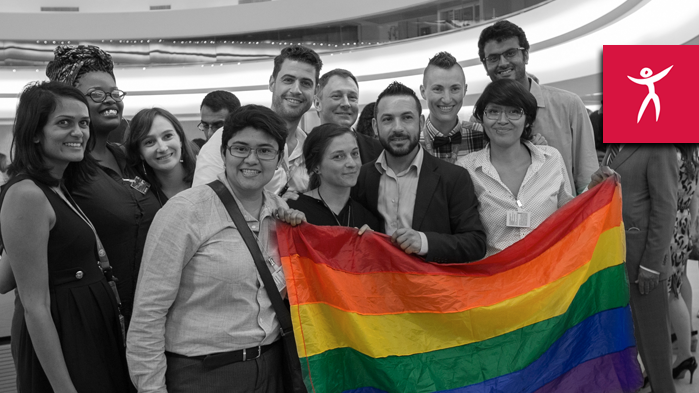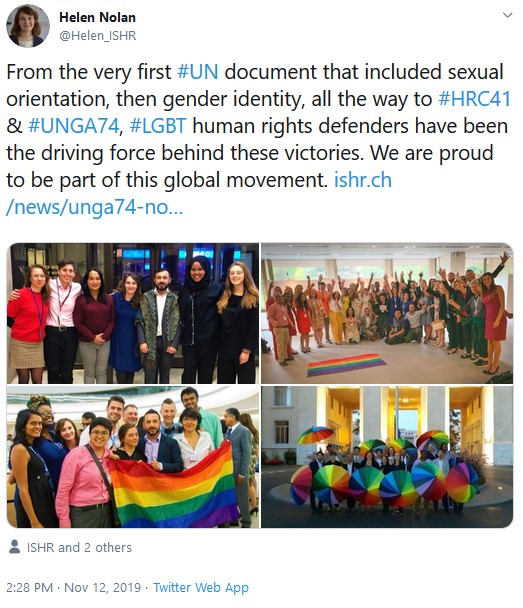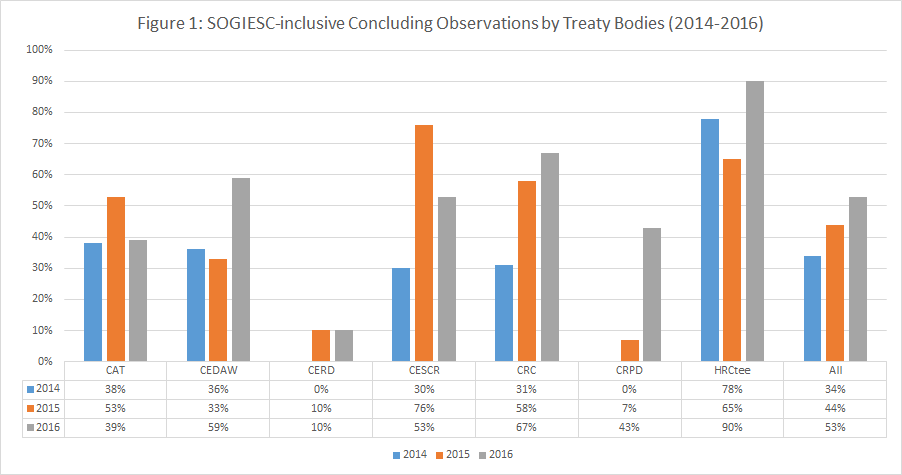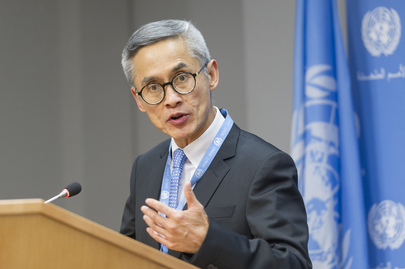Putting LGBT Issues on the UN Agenda

Summary
Human rights defenders push for UN mechanisms to recognize and address human rights violations faced by LGBT persons
Issue and Context
Lesbian, gay, bisexual and trans (LGBT) persons face serious human rights violations all over the world, including being marginalised, criminalised and even killed. Yet their situation is often ignored by governments at the national level. So human rights defenders turned to the UN.
There were many barriers:
- Using any terms related to sexual orientation and gender identity (SOGI) within the UN was completely taboo for States.
- Very few diplomats or even UN experts knew what these concepts meant or were aware of the human rights violations that LGBT persons faced around the world.
- Some States saw these issues as creations of the West – abhorrent to their cultural traditions and values.
- Few LGBT human rights defenders had the necessary knowledge or resources to be able to engage with the UN to draw attention to their issues.
As a result, until the 2000s, there had been almost no mention of LGBT issues at the UN, and certainly no government joint statements or resolutions to show that States recognised that violence and discrimination on the basis of SOGI were in fact human rights violations.
What did human rights defenders do?
Work was done by national, regional and international organisations (including non-LGBT organisations), bringing national advocacy goals to the UN, and uniting LGBT defenders across the globe to work for shared international advocacy goals. These goals included:
- Raising awareness and getting action from States in both New York and Geneva to draw attention to SOGI issues and improve the situation on the ground
- Building the capacity of human rights defenders so that they can better engage with UN human rights mechanism
- Obtaining financial resources to help defenders engage with the UN human rights mechanisms and participate in sessions in-person
- Sensitising the UN human rights mechanisms and diplomats to SOGI issue
- Compiling evidence of serious human rights violations on the basis of SOGI and ensuring it was included in UN documents – making it official
- Articulating and communicating how international human rights apply to SOGI issues
- Bringing together a core group of States willing to ‘champion’ SOGI issues at the UN

What happened at the UN?
New York
Human rights defenders met with diplomats to:
- sensitise them to SOGI issue
- raise awareness of the real threats that LGBT persons face
- convince them that action was needed, in particular including SOGI issues in UN statements and resolutions
- in 2016, defend the Special Procedure dedicated to SOGI issues that was created by the Human Rights Council
Human right defenders built up a core group of States willing to champion SOGI issues
Particular focus was on gaining support from States in the Global South, to counter arguments that these issues were a ‘Western’ concept
As a result, in 2000, sexual orientation, and later gender identity in 2012, were included in the annual resolution on extrajudicial executions
Strong government statements were made at the General Assembly, including by States from the Global South: for example, a statement by 67 states in 2008 and a statement by Rwanda in 2010 in relation to SOGI references in the resolution on extrajudicial execution
When States hostile to the Independent Expert on SOGI tried to dismantle the Special Procedure by making procedural challenges at the General Assembly, States who supported SOGI issues were able to defend the mandate (thanks to intense engagement by human rights defenders)
This support increased in 2019 to such a level that no challenge was brought against the Independent Expert at the General Assembly when its mandate was renewed
Treaty Bodies
Human rights defenders engaged with Treaty Body members to sensitise them to SOGI issues and raise awareness of the grave human rights violations they face, and to better equip the experts to make recommendations to States to combat these violations. This sensitisation was done through:
- Briefings
- Submitting shadow reports for country review
- Inputs to draft General Comments
- Individual complaints on the severe violations
Treaty Bodies began to regularly make recommendations calling on States to combat human rights violations against LGBT persons, thereby producing a body of ‘UN jurisprudence’ on SOGI issues, and giving tools for defenders to advocate for action by their Government
 References by Treaty Bodies to sexual orientation, gender identity, gender expression and sex characteristics (SOGIESC) in their Concluding Observations between 2014 and 2016
References by Treaty Bodies to sexual orientation, gender identity, gender expression and sex characteristics (SOGIESC) in their Concluding Observations between 2014 and 2016
Special Procedures
Human rights defenders engaged with Special Procedures mandate holders and their teams to sensitise them to SOGI issues and raise awareness of the grave human rights violations they face, and to better equip the experts to make recommendations to States to combat these violations. This sensitisation only required convincing an individual (the mandate holder) - as opposed to several members of a Treaty Body. This sensitisation was done through:
- Meetings with UN expert
- Providing briefings during country visits
- Submitting information for Special Procedures’ thematic reports
- Sending appeals and information on specific cases for communications and pushing for press release
The result was a number of expert, in-depth references to different human rights violations related to SOGI, which were contained in reports presented to the Human Rights Council. This forced discussion of SOGI issues and LGBT persons within the Human Rights Council, and also produced a body of ‘UN jurisprudence’ on SOGI issues
 References by Special Procedures to SOGIESC - compiled by ILGA & ISHR
References by Special Procedures to SOGIESC - compiled by ILGA & ISHR
Universal Periodic Review (UPR)
LGBT organisations engaged in the UPR process by:
- Submitting shadow reports
- Lobbying States
- Making statements
By getting States to make recommendations on SOGI issues to other States, human rights defenders were able to rely on and broaden their core group of ‘champion’ States, as well as use the recommendations within the UPR process to push for change in their respective countries
In the first two cycles of the UPR, 1,110 recommendations were made on SOGIESC issues - a 70% increase in recommendations between session 1 in 2008 and 22 in 2015.
Human Rights Council
Side events
- LGBT and generalist human rights NGOs organised numerous side events at the Council, with panels that included high level UN actors (such as Special Procedures), human rights defenders from around the globe, and participation of supportive States
- This led to greater visibility to the grave human rights violations based on SOGI, gave the issues a human face, and added to the credibility of defenders’ advocacy
Civil Society statements
- Mobilisation following careful network and coalition-building over many years
- Resulted in various joint statements with massive sign-on: including one by 500 NGOs from over 100 countries in 2014, and 600 NGOs from almost 150 countries in 2016, putting pressure on States to act and showing that violations on the basis of SOGI affected people around the world
Government Statements
- Human rights defenders lobbied at home and in the UN to push States to speak out publicly against human rights violations against LGBT persons, and call for action
- As a result, States made joint statements at the UN on SOGI issues: 2005 with 32 States, 2006 with 54 States, 2011 with 85 States – demonstrating a growing support for stronger action in the Human Rights Council
Resolutions
- Building on all the efforts above, LGBT and generalist NGOs lobbied States to table a resolution on SOGI, focused on reporting, and then demanding a concrete protection mechanism
- The process was very difficult, with a first resolution on SOGI tabled by Brazil in the Human Rights Council in 2003, but withdrawn when it was clear that it would not get sufficient votes to be adopted
- Eight years later, in 2011, a resolution was tabled by South Africa and adopted (three months after a joint statement of 85 States), calling on the OHCHR to prepare a report in 2011, and organise a panel in 2012 on violence and discrimination on the basis of SOGI
- In 2014, a resolution was tabled by four countries from Latin America and adopted – three months after joint statement of 500 NGOs – calling for an updated report by the OHCHR
- In 2016, a resolution was tabled by seven countries from Latin America and adopted, creating a Special Procedure on SOGI: the Independent Expert on violence and discrimination on the basis of sexual orientation and gender identity
- A resolution renewing the mandate of the Independent Expert in 2019 was tabled by the same States and adopted, this time with even greater support (4 more 'yes' votes and 6 fewer 'no' votes, with 55 States co-sponsoring.
What else was achieved?
At national level:
- Treaty Body, Universal Periodic Review and Special Procedure recommendations, and commitments made by States at the international level could be leveraged at home by human rights defenders.
At international level:
- Elaboration and adoption of the Yogyakarta Principles in 2006, and the Yogyakarta Principles plus 10 in 2017, which set out how international human rights law and standards apply to SOGI issues, including State obligations. These offered a tool that defenders could use to show that LGBT persons are not demanding new rights. They have helped advocacy and strategic litigation at the national, regional and international level to push for better protection of the human rights of LGBT persons.
- Reports of Special Procedures and OHCHR were released which focused on SOGI issues.
- By a resolution adopted in 2016, a specific special procedure mandate was created dedicated to SOGI issues – the Independent Expert on protection against violence and discrimination based on sexual orientation and gender identity. For more information on this mandate holder, click here.

Vitit Muntarbhorn, first Independent Expert on protection against violence and discrimination based on sexual orientation and gender identity, briefs journalists (2017)/UNPhoto



 References by Treaty Bodies to sexual orientation, gender identity, gender expression and sex characteristics (SOGIESC) in their Concluding Observations between 2014 and 2016
References by Treaty Bodies to sexual orientation, gender identity, gender expression and sex characteristics (SOGIESC) in their Concluding Observations between 2014 and 2016 References by Special Procedures to SOGIESC - compiled by ILGA & ISHR
References by Special Procedures to SOGIESC - compiled by ILGA & ISHR Vitit Muntarbhorn, first Independent Expert on protection against violence and discrimination based on sexual orientation and gender identity, briefs journalists (2017)/UNPhoto
Vitit Muntarbhorn, first Independent Expert on protection against violence and discrimination based on sexual orientation and gender identity, briefs journalists (2017)/UNPhoto
